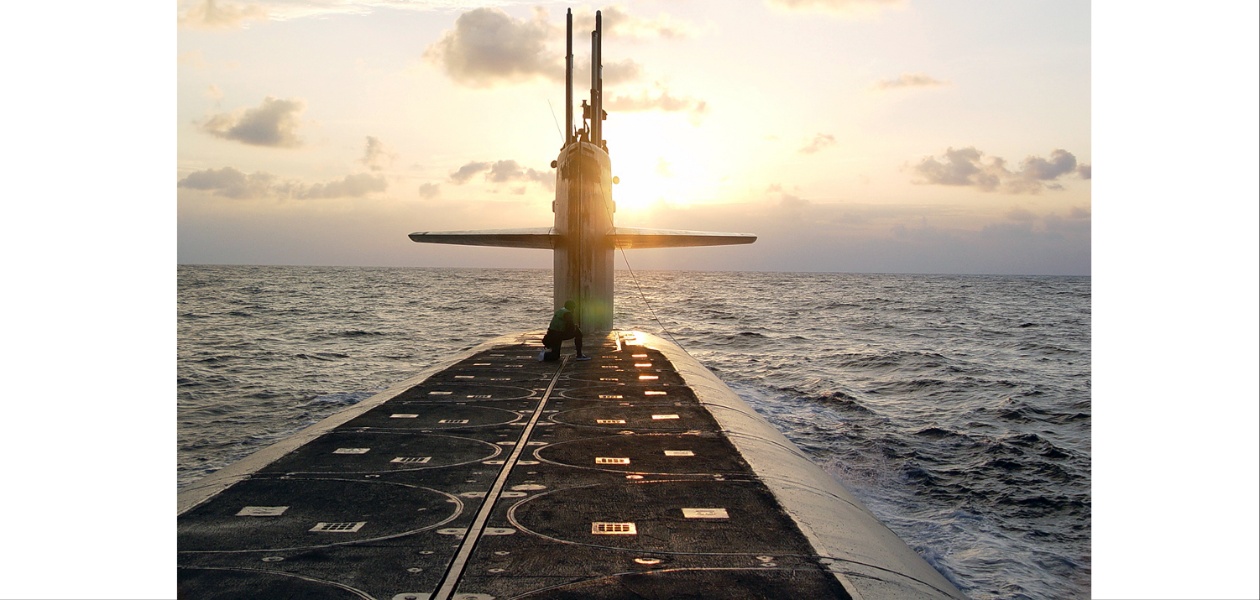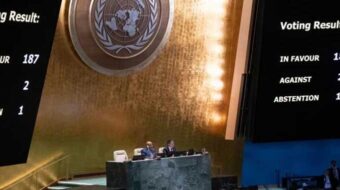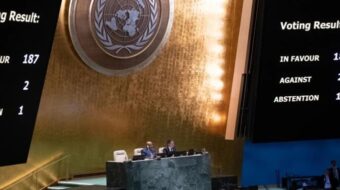
WASHINGTON—Just days after President Joe Biden announced his re-election campaign and told union reps at a gathering in Washington about the variety of progressive bills he has passed and others he intends to support in a second term, he is now unrolling a dangerous and major escalation in his administration’s militaristic foreign policy.
Biden, meeting in the White House Wednesday with South Korea’s President Yoon Suk Yeol, signed a pact that, among many other facets, involves sending nuclear ballistic missile submarines to South Korea. It will be the first major infusion of nuclear weapons into South Korea by the United States since the 1970s when the U.S. stationed nuclear weapons throughout that country.
Biden administration officials claim the move is to counter alleged threats from North Korea. Those claims, however, don’t explain Biden’s plans to meet with the right-wing Ferdinand Marcos, Jr., government in the Philippines to hammer out similar deals there. Nor does it account for the current installation of U.S. military airstrips in Tinian, a small Pacific island from which the U.S. launched the planes that dropped the infamous atomic bombs on Hiroshima and Nagasaki. All of those moves, including the nuclear sub deal with Australia and attempts to bring NATO to the South Pacific are, of course, part of the overall U.S. strategy of encircling and “containing” China.
Wednesday’s talks at the White House also centered around the Biden administration’s attempts to get South Korea to send hundreds of millions of extra dollars in military aid to Ukraine—another matter unrelated to protecting South Korea from threats allegedly coming from the North.
President Yoon has been in office only a year, having replaced a South Korean administration that had called for détente and peaceful relations with the North. The U.S. armament companies, the same ones that back U.S. military intervention in Ukraine, were major supporters of Yoon, who ran a right-wing campaign calling for increased militarization of South Korea. His invitation to the White House is a clear signal of the Biden administration’s support for his policies and also an intent to involve South Korea more in the war in Ukraine.

Yoon is being given all the honor and glory of an official state visit, with a dinner Wednesday night hosted by First Lady Jill Biden.
The Associated Press reports that three senior Biden administration officials, who briefed reporters on the condition of anonymity, said that Biden and Yoon aides have been working on details of a plan called the “Washington Declaration” for months and agreed that “occasional” and “very clear demonstrations of the strength” of U.S. extended deterrence capabilities need to be an essential aspect of the agreement.
The claim in Washington is that the Biden administration is merely responding to requests from South Korea, rather than escalating militarism and tensions in East Asia on its own. The deal signed at the White House also calls for the U.S. and South Korean militaries to strengthen “joint training” and better integrate South Korean military assets into the “joint strategic deterrence effort.”
Yoon became the favorite of the armaments makers in the U.S. when, as a candidate, he called for not just nuclear submarines but sharp increases in the numbers of U.S. bombers and aircraft carriers in and around his country. He blasted his predecessor, President Moon Jae-in, for being too much of a pacifist when it came to North Korea and China.
As for aid to Ukraine, Biden says he wants South Korea, which has already sent $239 million in weapons and support to Ukraine, to play an even bigger role in “deterring Russia.” The recent leak of classified documents by a Massachusetts airman revealed that the U.S. has been pressuring South Korea for some time when it comes to shipping ammunition to Ukraine via Poland.
The U.S. desire was that Seoul would sell 330,000 rounds of 155 mm munitions to Poland, which would then pass it on to Ukraine. Poland has been serving as the conduit for huge streams of U.S. and NATO weapons being poured into the war.
Also according to the AP, one administration official said that Biden is talking to Yoon about “what it means for all like-minded allies to continue to support Ukraine” and he is asking the South Korean leader “what the future of their support might look like.”
We hope you appreciated this article. Before you go, please support great working-class and pro-people journalism by donating to People’s World.
We are not neutral. Our mission is to be a voice for truth, democracy, the environment, and socialism. We believe in people before profits. So, we take sides. Yours!
We are part of the pro-democracy media contesting the vast right-wing media propaganda ecosystem brainwashing tens of millions and putting democracy at risk.
Our journalism is free of corporate influence and paywalls because we are totally reader supported. At People’s World, we believe news and information should be free and accessible to all.
But we need your help. It takes money—a lot of it—to produce and cover unique stories you see in our pages. Only you, our readers and supporters, make this possible. If you enjoy reading People’s World and the stories we bring you, support our work by donating or becoming a monthly sustainer today.












Comments